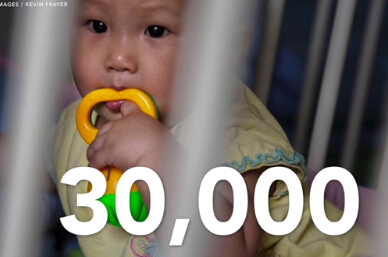China's more than 30-year-old one-child policy is drawing to a close. The country's lawmakers passed an amendment to the policy, and it's plain and simple: "The state advocates that one couple shall be allowed to have two children."
中国实行30多年的独生子女政策即将结束。中国立法者通过了一项修正案,即“国家提倡一对夫妇生育两个孩子”。
The policy was put in place to stave off rapid — and potentially damaging — population growth in the country. Officials were worried there would be too many people with too few resources available to them.
独生子女政策的实施是为了防止迅速,且具有潜在危害的人口增长。官员担心人口太多而资源太少。
But three decades later, China's population is growing old, and there aren't enough young people to balance the scales.
但三十多年后,中国的人口正在老龄化,而且没有足够的年轻人来平衡。

The Wall Street Journal cites United Nations data that estimates "the number of Chinese people over the age of 65 will jump 85% to 243 million by 2030." There are currently about 131 million Chinese people over age 65 in the country.
《华尔街日报》援引联合国的数据,估计到2030年中国65岁以上的人口猛增百分之85达到两亿四千三百万。目前中国65岁以上人口为一亿三千一百万。
But there's a possible problem: Some suggest a change in policy won't be enough to encourage more childbirth in the country.
但可能有一个问题:一些人认为政策上的变化不足以鼓励生育更多的孩子。
"The cost of living is very high in Chinese cities like Beijing, Shanghai. Many couples may choose to opt out of having a second child".
“中国城市的生活成本非常高,比如北京、上海。许多夫妇可能会选择不生育第二个孩子“。
And that sentiment seems to be backed by the numbers. In January, state-run Xinhua reported an estimated 30,000 Beijing couples applied to have a second child under the country's relaxed regulations on the one-child policy. Officials expected at least 50,000 would have applied.
这种观点似乎得到了数据上的支持。一月,据新华社报道,3万对北京夫妇在国家放宽独生子女政策下申请了第二个孩子,而官方预计至少会有5万对夫妇。
China's one couple, two-child policy takes effect Jan. 1, 2016.
中国一对夫妇二个孩子政策将于2016年1月1日生效。
译文属可可原创,仅供学习交流使用,未经许可请勿转载。












